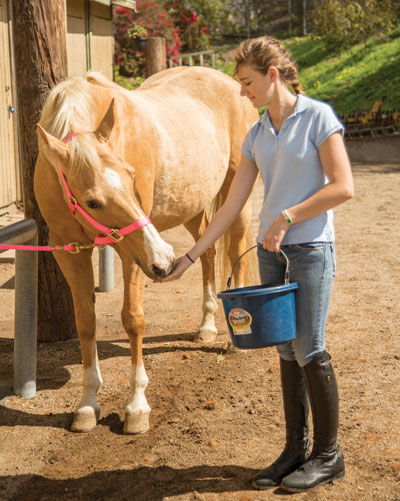
Just like you, your horse needs a balanced diet for good overall health. But your horse’s feed needs are quite a bit different than yours. Here are a handful of rules to feed a horse by to help you make sure your horse is eating a proper diet.
Rules to Feed a Horse By: Forage First
The almost-constant munching of forage throughout the day keeps your horse’s teeth in good shape and helps reduce the chances of stomach ulcers, colic and even boredom. Better yet, almost all of your horse’s nutritional needs can come from forage, thanks to the billions of microorganisms in your horse’s gut that help break down grass and hay!
 If your horse doesn’t have access to pasture during certain times of the year, hay is a great substitute. Just remember, not all hay is created equal. Alfalfa hay is high in protein and calcium, while some grass hays like timothy or orchard grass hay have fewer overall nutrients and calories. Either type of hay can be right for a horse, depending on his individual needs.
If your horse doesn’t have access to pasture during certain times of the year, hay is a great substitute. Just remember, not all hay is created equal. Alfalfa hay is high in protein and calcium, while some grass hays like timothy or orchard grass hay have fewer overall nutrients and calories. Either type of hay can be right for a horse, depending on his individual needs.
In addition to the type of hay, pay attention to the amount your horse is getting. A good rule of thumb is that an average-sized (1,000-pound) adult horse should consume roughly 20 pounds of hay per day. If possible, feed hay flakes throughout the day instead of feeding just two meals per day.
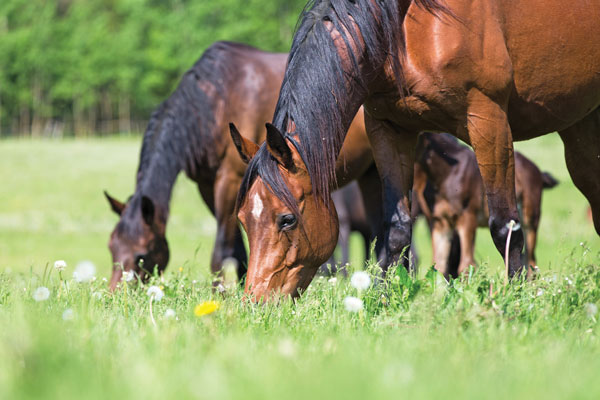
The Way to Weigh a Horse
Weighing your horse is a great way to make sure you’re feeding him the right amount. But how do you weigh such a large animal? A small tool called a weight tape is the perfect answer. A weight tape is thin and flexible and wraps around your horse’s body at the girth. Pull it snug, and then read the number where the end meets to get an estimate of your horse’s body weight.
Most feed and tack stores have weight tapes. If you board your horse, chances are there is one hiding somewhere in the feed or tack room.
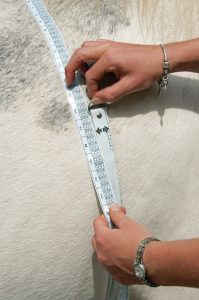
Once you “weigh” your horse, be sure to write down both his weight and the date. This helps you monitor your horse’s weight over time. Try weight-taping your horse monthly. If you find his weight going up into an unhealthy range, consider reducing his feed intake. If his weight goes down until he is a bit skinny, then ask your vet for ways to bring his weight back up.
Good Grains
Feeds called “concentrates” contain grains, which are full of calories. These are great if your horse is in heavy exercise, like three-day eventing or lots and lots of long trail rides. Feeding your horse high-energy grains is similar to you fueling up on a huge breakfast before a big test at school or a long day of exercise—this food gives you the energy you need to complete the task, right? Same for your horse.
However, your horse may not need the same amount of grain all the time. If there are months when you are riding less often, or if you notice your horse acting “hot,” meaning he has too much energy and is hard to handle, you may want to cut back on the grain for a while. Talk to your veterinarian if you think you might need to change your horse’s diet in this way.
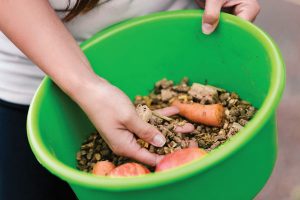
Special Seniors
Senior horses sometimes have a harder time maintaining their weight. This can be due to various reasons, including dental problems and metabolic issues. Older horses’ bodies work harder to stay warm and maintain muscle, and their digestion and absorption of food isn’t as efficient as when they were younger. Therefore, if you own a senior horse, he may need a special diet.
Special senior feeds are available that are balanced for all the nutrients he needs, and are easier for an older horse to eat. These are complete feeds that can be fed to meet 100 percent of his requirements, but it can get expensive and may not be necessary.
You may consider soaking your horse’s hay to make it softer to chew and to reduce dust. He may even need to switch to hay cubes or pellets that can be soaked into a softer gruel.
There are lots of ways to enhance a senior horse’s diet to make sure he’s getting the right nutrients. Remember to weight tape your senior horse regularly so you can catch any weight changes early.
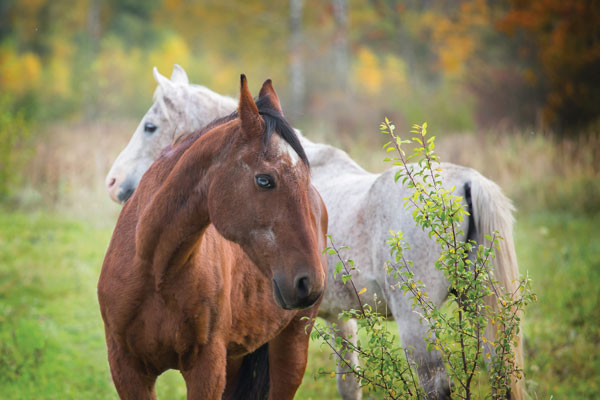
A Balanced Diet
Just as you don’t necessarily eat the same foods as your friends, not all horses should be fed exactly the same way. The amount and type of grains, supplements and forages you give your horse depend completely on his age, breed, health and how and how much you ride him.
Although this may sound complicated, don’t worry. Commercial horse grain mixes from the feed store are balanced so they contain what your horse needs to stay healthy.
Vitamins are abundant in good-quality pasture and most hays. Offering a trace mineral salt block (the brown type) provides extra minerals and takes care of your horse’s salt requirement, which horses will self-regulate. If you’re not sure, you can provide a plain white salt block and a vitamin/mineral supplement per label directions.
To learn more about what your horse needs to eat, talk to your veterinarian, who can explain more about your horse’s dietary needs and the best rules he or she uses to feed by.
Understanding your horse’s diet and feeding what he need s should result in good health, a shiny coat, nice muscle tone and fuel for your next ride!
This article on rules to feed a horse by appeared in the January/February 2020 issue of Young Rider magazine. Click here to subscribe!

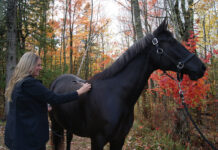
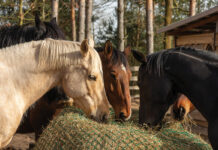
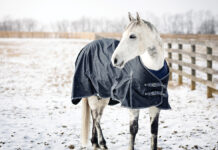
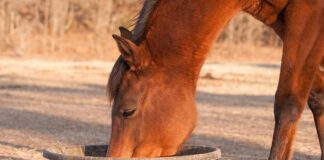

The horse’s digestive system is specially equipped to continually process high-fiber, low-energy food called forage.
It’s good to know that horses commercial horse grain mixes from large animal feed stores will be balanced and contain all that a horse needs to stay healthy. While everything else it may need it can just get from grass. I’ll have to always stock up on grain and hay then. My cousin is working abroad for a year so she left me in charge of taking care of her house and kid. Those two I can manage, but it’s her horse that I have no experience dealing with. I’m glad to know that feeding it doesn’t seem like it’ll be that difficult. If anything goes wrong I’ll just take it to a vet like you suggested.